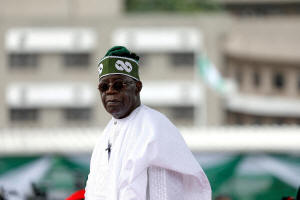|
The
ruling will give the 71-year-old Tinubu a clear mandate to
govern Africa's most populous nation, which is grappling with
double-digit inflation, foreign currency shortages, a weakening
naira, widespread insecurity and crude oil theft.
Nigeria returned to democracy in 1999 after three decades of
almost uninterrupted military rule, but accusations of
ballot-rigging and fraud have followed its electoral cycles.
The judgment by seven Supreme Court judges, which is final,
follows a pattern seen in previous presidential elections that
have been challenged in court. None of the attempts to overturn
results through the courts has been successful.
Atiku Abubakar of the People's Democratic Party and Peter Obi of
the Labour Party came second and third respectively in the
February vote, but rejected the result and called for Tinubu's
win to be annulled.
The two opposition leaders had appealed a Sept. 6 tribunal
judgment that endorsed Tinubu's victory.
In the appeal, they argued that the electoral commission failed
to electronically transmit results from polling stations to an
online portal, which undermined their authenticity.
They also said Tinubu had won less than 25% of the vote in the
federal capital Abuja so he did not meet the legal threshold to
become president.
The judges dismissed all their arguments.
"There is no merit in this appeal, and it is hereby dismissed,"
said Supreme Court judge John Okoro.
The court also rejected Atiku's bid to introduce new evidence
that alleged Tinubu had submitted a forged university
certificate to the electoral agency. Tinubu had denied this.
(Reporting by Camillus Eboh and MacDonald Dzirutwe; Editing by
Estelle Shirbon and Sharon Singleton)
[© 2023 Thomson Reuters. All rights
reserved.] Copyright 2022 Reuters. All rights reserved. This material may not be published,
broadcast, rewritten or redistributed.
Thompson Reuters is solely responsible for this content.

|
|




